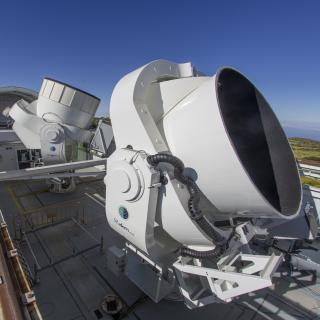Bibcode
Génova-Santos, R.; Rubiño-Martín, J. A.; Peláez-Santos, A.; Poidevin, F.; Rebolo, R.; Vignaga, R.; Artal, E.; Harper, S.; Hoyland, R.; Lasenby, A.; Martínez-González, E.; Piccirillo, L.; Tramonte, D.; Watson, R. A.
Referencia bibliográfica
Monthly Notices of the Royal Astronomical Society, Volume 464, Issue 4, p.4107-4132
Fecha de publicación:
2
2017
Número de citas
61
Número de citas referidas
56
Descripción
We present Q-U-I JOint TEnerife (QUIJOTE) intensity and polarisation
maps at 10-20 GHz covering a region along the Galactic plane 24°
≲ l ≲ 45°, |b| ≲ 8°. These maps result from 210 h
of data, have a sensitivity in polarisation of ≈40 μK
beam-1 and an angular resolution of ≈1°. Our intensity
data are crucial to confirm the presence of anomalous microwave emission
(AME) towards the two molecular complexes W43 (22σ) and W47
(8σ). We also detect at high significance (6σ) AME
associated with W44, the first clear detection of this emission towards
a supernova remnant. The new QUIJOTE polarisation data, in combination
with Wilkinson Microwave Anisotropy Probe (WMAP), are essential to (i)
determine the spectral index of the synchrotron emission in W44,
βsync = -0.62 ± 0.03, in good agreement with the
value inferred from the intensity spectrum once a free-free component is
included in the fit; (ii) trace the change in the polarisation angle
associated with Faraday rotation in the direction of W44 with rotation
measure -404 ± 49 rad m-2 and (iii) set upper limits
on the polarisation of W43 of ΠAME < 0.39 per cent (95
per cent C.L.) from QUIJOTE 17 GHz, and <0.22 per cent from WMAP 41
GHz data, which are the most stringent constraints ever obtained on the
polarisation fraction of the AME. For typical physical conditions (grain
temperature and magnetic field strengths), and in the case of perfect
alignment between the grains and the magnetic field, the models of
electric or magnetic dipole emissions predict higher polarisation
fractions.
Proyectos relacionados

Experimento QUIJOTE CMB
QUIJOTE es un programa de dos telescopios y su batería de instrumentos, instalados en el Observatorio del Teide, dedicados fundamentalmente a la caracterización de la polarización del Fondo Cósmico de Microondas, en el rango de frecuencias de 10-42 GHz.
José Alberto
Rubiño Martín